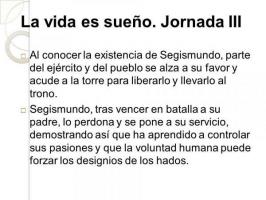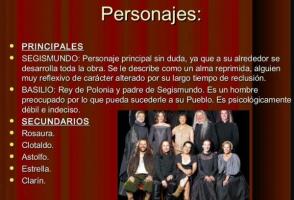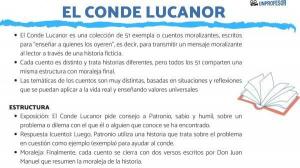YERMA: main and secondary characters
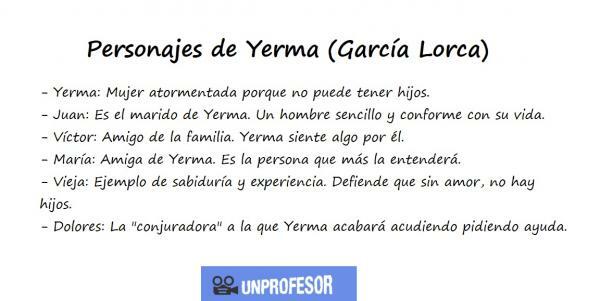
Within the literary production of Federico Garcia Lorca we find a theatrical piece that talks about women and about the struggle between desires and destiny. Yerma is one of the most studied works of this acclaimed writer of the Generation of 27 and it has a very particular element: it is a tragedy that has four main characters and the others can be considered as "choirs". This is what Lorca himself said about this theatrical creation, a work that was baptized as a "tragic poem." In the same title we can already glimpse that the entire work will revolve around the same character, Yerma, on whom almost all the dramatic force will fall. In this lesson from a TEACHER we will analyze the Yerma main and minor characters to better understand this literary work so studied in schools and institutes.
Before entering fully into the analysis of Yerma's characters, we are going to stop for a moment to know the plot of this work by Federico Garcia Lorca and to be able to understand how the characters act throughout the plot. Here you will find a
summary of Yermabut, next, we show a diagram with the essential elements of the argument:- Yerma is a young woman who is married to Juan, husband, a farmer. Both live in a small provincial town and are married by a pact between relatives.
- The reason why Yerma agrees to the wedding is, above all, because she wants to be a mother. She has been trying to conceive a child with her husband for a long time but her fruit does not come. This causes Yerma to enter an emotional maelstrom of sadness and pain as she does not understand why she cannot conceive children.
- While Yerma suffers this unhappy fate, Juan doesn't seem to care about the situation. He is already happy with the life he has and does not need anything else.
- In time, Yerma will realize that she is not in love with Juan. She especially will notice it when she is close to Victor, a lifelong friend of hers who awakens new and unexpected feelings.
- Juan wants to closely monitor his wife her because she begins to realize that she leaves the house too much. In order to control her as much as possible, she makes her sisters go live in her house and, thus, know where Yerma is at all times.
- But the woman will continue with her obsession of wanting to have children and she will end visiting a healer so that she, with a spell, she allows him to procreate.
- Juan will still not understand why Yerma is so obsessed with being her mother. In the end, Desperate Yerma will end up killing Juan and the play ends with the shouts of the protagonist "I myself have killed my son."
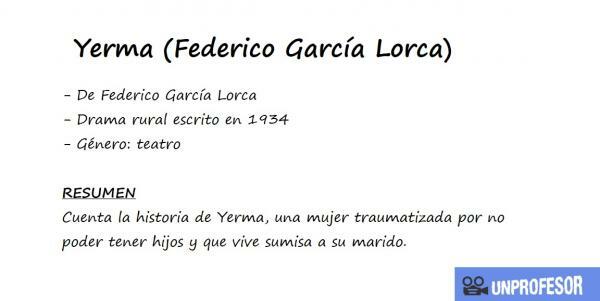
Now that we have been able to know a few lines about the argument, we are going to dive right into discovering better Yerma's characters and, for this, we will start with the protagonist of the play and the one who gives it its name: Yerma.
Yerma is a married woman for convenienceTherefore, we are before a woman who has renounced her love in her life and who has accepted the couple that her father decided for her. Faced with this situation, the woman clings to an idea: have a child. But this desire will not be at all easy to achieve because, as she announces her own name, her destiny seems to be marked for her to be a woman who cannot conceive children.
In the same name of the work and the protagonist, Yerma, Lorca already announces the dramatic problem that will develop throughout the text. From the beginning we know that the protagonist is barren, therefore, that she cannot conceive children. Therefore, in this text the final outcome does not matter so much of the main theme (which we already know) but how the destiny of the protagonist and the drawing of the character's psychology are being fulfilled.
Yerma, therefore, despite having her fatal destiny in her own name, she continues to be determined to be a mother. He does not accept reality and he's still struggling to conceive a child. Faced with this situation, Juan will talk to her about the possibility of adopting one of his nephews but the woman will refuse. resounding because her desire is not to raise a person but to have it inside her, to feel how she grows day by day. day. This tells us that Yerma's problem is not sentimental but rather a biological, irrational desire, that is born from within and that cannot be satisfied for many years that pass.
The Characteristics of Yerma's character most prominent are the following:
- Biological and innate desire that she cannot control
- Passionate and tormented woman
- She is irrationally carried away by a wish that she will not be able to fulfill
- Rigid concept of honor
- Woman who lives in an environment without love and without passion
- She feels empty not having the ability to conceive
- As the work progresses, we witness the decline of this character, who goes from showing herself as a tender being to ending up murdering her husband in cold blood
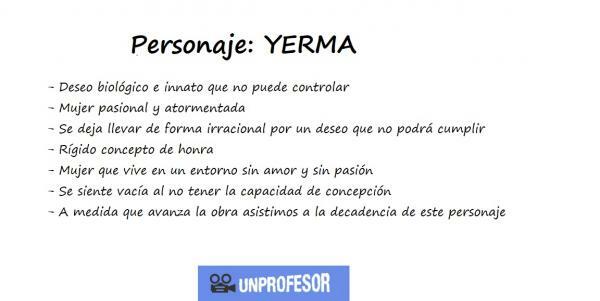
We continue talking about Yerma's characters to focus now on another very important character in the development of this work: Juan, Yerma's husband.
Initially Juan is presented to us as a victim of Yerma's wishes. The husband cannot give her what his wife longs for and he lives trying to alleviate the sorrows of his wife. However, as the work progresses we see that Juan is a dominant person that he wants to control her wife at her house and that he even argues with her when he goes out for a walk. In Act Two we will see that Juan has made his sisters go to live with them for the simple fact of having his wife under control.
Juan isn't so tormented by the fact that he can't have children; It will be he who proposes to Yerma to adopt one of her nephews and that, thus, his wife can be at peace. But she will not accept this proposal and Juan will only want to keep up appearances so that no one from the town talks about them. He begins to suspect the behavior of her wife, since she goes out a lot and there are whispers in the town; For this reason, the couple will argue several times during the play and Juan will force Yerma to stay home.
We are shown a simple character who does not need much of life to be happy: being a farmer and seeing how his economy improves, he already feels happy. He has a normal and ordinary life, just as everyone expects from a person like him. But his wife does not, and this contradiction will mark the great distance between the two characters.
Characteristics of Juan's character
- Simple country man without too many ambitions
- He does not pursue anything else in life, he is satisfied with his reality
- Her only motivation in her life is to have better crops
- People's opinion matters a lot
- He is satisfied with a comfortable and quiet life
- The figure of Juan is erased by the passion and obsession of Yerma, his wife
- In the end, Yerma's overflowing strength will end up truly annihilating this character.
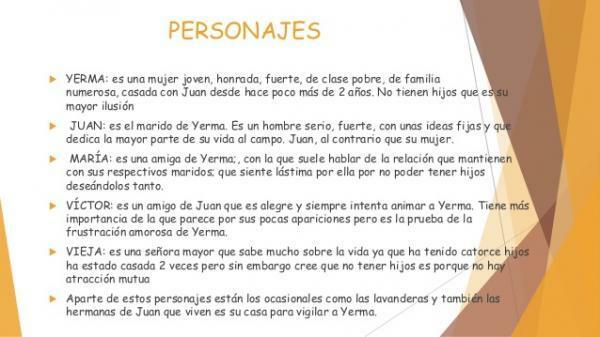
We close this lesson with the characters of Yerma to speak, now, of the most secondary characters of this tragedy. They are like satellites that move around the protagonist and that help to further shape Yerma's psychology and her personal drama. Here you have them:
- Victor: she appears rarely in the work but her appearance is essential. With him we discover that Yerma does not really love her husband and that she lives a constant repression in her life. She is in love with Victor and, as it is intuited, it seems that he also feels something of her for her. With the character of Víctor we understand even more that the protagonist's frustration with her life is so great that the fact of being a mother is conceived by her as a lifeline to have love and happiness.
- Mary: he is the character that helps Yerma show us her feelings towards being a mother. María encourages the protagonist to speak and tell us about her desires, her despair and her frustration. She is a childhood friend and she is a mother, she feels very sorry for Yerma's fate because she understands her desire to be a mother.
- Old woman: he is a character that appears in two pictures of the play and has an important role in the plot. She has 14 children and has been married to two different men. He defends that it can only be conceived if there is love in a couple so he throws an idea to Yerma, a possible solution to her destiny. He presents himself as a wise and experienced character that Yerma turns to looking for answers.
- Dolores: she is the one who plays the role of "conjurer", the sorceress that Yerma will go to at the end of the play in order to have a child.

